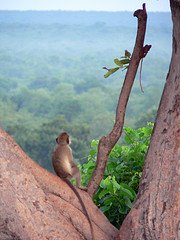This is not the first evidence of cultural traditions or transmission among non-human primates, but it is another notable case study.
A note to the authors of the original source: It certainly seems that it's time to drop the "human" as a modifier for the word culture; putting it in quotes no longer suffices.
Dr Moura carried out his research in the Serra da Capivara National Park, in the Piaui state of north-east Brazil, during which he observed bouts of stone-banging, primarily among a group of 10 monkeys. As he approached, the monkeys would first search for a suitable loose stone, then hit it on a rock surface several times.
The act was apparently an aggressive one, directed at Dr Moura as a potential predator, but as the group became used to his presence in the area the stone-banging decreased. Furthermore, in a large minority of cases, adults and juvenile monkeys were seen banging the stones together without paying him any attention at all - suggesting that the younger monkeys were learning the skill from their more experienced elders. Captive monkeys released into the area that joined the study group also appeared to be learning to bang stones from the others.
Given the evidence and the apparent meaning of the stone-banging gestures, perhaps the next important consideration is whether we ought to heed the demand to leave the monkeys alone.
For full text of news announcement see: New evidence of 'human' culture among primates


0 Comments:
Post a Comment